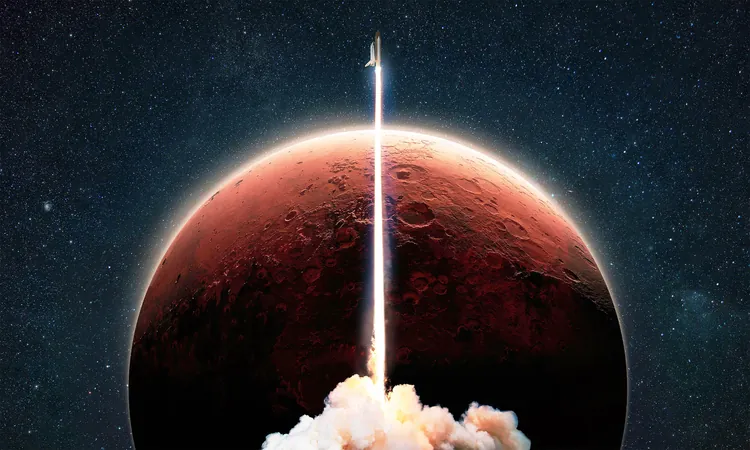
Astronauts Eyeing Mars Face Kidney Challenges as Critical Organs May Falter During Space Travel
2025-03-30
Author: Ying
Introduction
As humanity gears up for ambitious missions to Mars, researchers express concerns about the health of astronauts, particularly focusing on their kidneys. Recent studies have unveiled troubling prospects for these vital organs, which could be more vulnerable than previously thought during extended journeys away from Earth.
Importance of Kidney Health
The kidneys play a crucial role in filtering waste and balancing fluids, but new research suggests they may suffer significant repercussions from long-term exposure to microgravity and cosmic radiation. These findings build on previous studies that have flagged health issues faced by astronauts throughout the history of human spaceflight.
The Research Study
Dr. Keith Siew from the London Tubular Centre, in partnership with a consortium of over 40 global institutions, has led a comprehensive analysis to better understand kidney health in space. This effort involved examining data from 20 different research groups linked to more than 40 missions to the International Space Station, alongside laboratory simulations involving mice and rats.
Key Findings
The research represents the largest investigation into the effects of space travel on kidney function to date, notably including insights related to the budding industry of commercial space travel. In one of the study's simulations, rodents were exposed to radiation that replicated conditions of a two-and-a-half-year journey beyond the Earth’s protective magnetic field.
Impact of Microgravity
One of the most concerning discoveries was that prolonged microgravity conditions seem to alter both the structure and function of kidneys. After just a month in this unique environment, specific kidney tubules responsible for managing minerals like calcium and salt were shown to shrink. This change can elevate the risk of kidney stone formation, challenging earlier assumptions that linked the onset of stones primarily to bone density loss during space travel.
Risks of Galactic Cosmic Radiation
Unlike astronauts operating in low Earth orbit, who benefit from some protection due to Earth's magnetic field, a Mars mission would see crews fully exposed to Galactic Cosmic Radiation. Alarmingly, mice that underwent radiation exposure equivalent to a lengthy space mission displayed irreversible kidney damage, sparking concerns about the sustainability of astronauts’ health during future expeditions.
Urgent Need for Solutions
"If we don’t find effective ways to protect the kidneys, astronauts could face severe complications requiring dialysis either during their journey home or upon their arrival on Mars," highlighted Dr. Siew, emphasizing the urgency of addressing these health risks.
Broader Implications
This new evidence reinforces the perplexities surrounding kidney health in space, shifting the focus from traditional concerns over bones and cardiovascular health. Continuous exploration of kidney adaptation—or failure—will be critical as space agencies plan long-duration missions that push the limits of human endurance and health.
Potential Advancements in Medicine
Moreover, the implications of these studies extend beyond astronauts; potential breakthroughs might lead to advancements in treatments for patients on Earth, particularly those undergoing radiation therapy for cancer. By improving kidney resilience to radiation, these discoveries could revolutionize care for many.
Conclusion
As researchers work to find solutions to these pressing health challenges, the collaborative nature of this international study suggests a growing commitment to safeguarding astronauts' well-being as they venture farther than ever before. The data gathered could help pave the way for safer, longer journeys, setting the stage for a new era of space exploration.
Publication
The complete study has been published in Nature Communications, adding to a body of knowledge that is essential for ensuring the health and safety of those who dare to travel to Mars and beyond.
Future Updates
Stay tuned for more insightful updates as technology and research progress toward making interplanetary travel a reality!



 Brasil (PT)
Brasil (PT)
 Canada (EN)
Canada (EN)
 Chile (ES)
Chile (ES)
 Česko (CS)
Česko (CS)
 대한민국 (KO)
대한민국 (KO)
 España (ES)
España (ES)
 France (FR)
France (FR)
 Hong Kong (EN)
Hong Kong (EN)
 Italia (IT)
Italia (IT)
 日本 (JA)
日本 (JA)
 Magyarország (HU)
Magyarország (HU)
 Norge (NO)
Norge (NO)
 Polska (PL)
Polska (PL)
 Schweiz (DE)
Schweiz (DE)
 Singapore (EN)
Singapore (EN)
 Sverige (SV)
Sverige (SV)
 Suomi (FI)
Suomi (FI)
 Türkiye (TR)
Türkiye (TR)
 الإمارات العربية المتحدة (AR)
الإمارات العربية المتحدة (AR)